Imagine the efficiency of instantly receiving HR leave approvals from AI-powered chatbots. This is the transformative power of ERP AI chatbots, enabling seamless interaction and automated processes.
Businesses have transformed with Enterprise Resource Planning (ERP) to streamline their core business process for manufacturing, HR, finance, supply chain, sales, and procurement. Automation can bring a major shift to optimize ERP efficiencies and decision-making to implement strategies. ERP systems are considered central databases that allow easy access to standard data update compliances and improve data security.
ERP AI Chatbots are recreating the outlook of how users can interact with complex systems, routine operations, and workflows. If we talk about the popularity of AI chatbots in this domain, the possibilities are endless. This can be observed from the increase in market size of USD 7.76 billion in 2024, growing at a CAGR of 23.3% from 2025 to 2030, as per Grand View Research.
Let’s dive into the details of how organizations set up automation using in-built assistants with ERP systems to optimize workflows using natural language queries. We will break down the benefits, use cases, and costs associated with integrating AI chatbots into the ERP system for a smooth process.
You can also develop our own ERP chatbots. For that, you can partner with an AI chatbot development company. They create the best ERP chatbots suited to your needs.
What is an ERP AI Chatbot?
To make it simple for you, ERP AI chatbot is an artificial intelligence-powered software that automates user interaction using natural language processing or NLP. How is it possible? Chatbot processes user’s questions using NLP and optimizes data input into the backend system to provide relevant responses. Artificial intelligence can deliver support for other core tasks, including data retrieving, testing data, generating reports, and sharing the best recommendations for users.
Suppose you are dealing with a manufacturing company. Now, the finance department wants to approach the marketing department to collect data that was spent on advertising last month. Now, with the help of an ERP Chatbot system, they can simply log in and access the data using virtual assistance, even from a remote setup.
Integrating automated chatbots in ERP systems can easily configure user interaction and manage data integrity and security. So, an organization can ensure savings by not compromising any crucial data and maintaining integrity with quality data.
Key Benefits of ERP AI Chatbots
So, can an AI-powered ERP assistant only answer employee queries? While the primary function is to facilitate user interaction and communication, the core capabilities can extend beyond the function to optimize workflows. Here is the list of benefits of using intelligent ERP chatbot solutions to manage business operations:
1. Resolve Complex Queries
ERP chatbot can answer employee queries in multiple ways. You can integrate the system as FAQ assistance to respond to queries quickly. It can be added as a troubleshooting mechanism to diagnose and address issues of minimum downtime. Also, a step-by-step tutorial for stepping-down answers to complex errors and processes.
2. Data-Centric Decision
ERP chatbots can facilitate data collection and take invaluable insights with the help of AI and machine learning. Integrating with ERP, a chatbot can easily integrate valuable data input and provide centralized access across various departments of the organization.
3. Flexibility
Adding an ERP chatbot can allocate resources using real-time data forecasting and scale operational capabilities. Chatbot adds more flexibility to the streaming process to automate notifications and allocate tasks for user roles, supporting agile decision-making.
4. More Transparency
Most organizations often struggle with a lack of processes and limited access to departments, resulting in delays in decisions. Using an ERP AI chatbot can add more transparency to workflows with centralized data and automation. This can also lower risk and take on early prediction for any flaws.
5. Personalized Assistance
Mid and large-sized organizations can use large volumes of data, and there might be overlapping key information, such as task history, department roles, and past interactions. It helps anticipate employee needs and provides AI-powered ERP assistance to foster a positive work environment.
6. Adaption and Continual Learning
One of the integral benefits of ERP AI chatbots is their core ability to learn and improve the quality of responses continuously. Emerging tech like deep learning, natural language processing, machine learning, or semantic parsing can evolve and generate more human-like responses.
How ERP AI Chatbots Work?
If you go through the mechanism of how ERP AI chatbots can function and understand its three-tier architecture. It comprises three layers – front-end, middle-tier, and back-end- that integrate with AI chatbots and are associated with the organization’s ERP system. Let’s understand how it works:
1. Front End
It acts as a user interface through which employees can interact and get access to different functions integrated with the ERP system – FAQs, website, chat features, or voice assistant to get familiar with user experiences.
Modes: Voice Assistance, Messaging platform, Mobile App, and web application like ERP portal or web-based chat widget.
2. Middle-End
As this layer occurred in the middle of front-end and back-end systems, the ERP system with the AI chatbot receives user inquiries and requests. Also, the information is processed using AI algorithms to capture the context and intent of the conversations.
Core element: API requests, secured access, and workflow automation
Some of the APIs you can consider are AWS, Azure, Node.js Express, FastAPI, Flask, or Spring Boot.
3. Back-End
As the core system that comes after receiving data inputs, processing information, and using ERP AI chatbots to its associate database, using the central repository for key business details on customer profiles, order histories, and inventory levels can send back the right responses to queries.
Components: AI Processing, data with ERP modules, data storage, security or access control, or RPAs.
Here are the core functions of AI-powered ERP assistant to deliver backing its three-layer architecture:
- Communication with users through text or voice inputs.
- Timely access to database and retrieval information for user queries.
- Automate routine processes of data entry, report generation, or system updates.
- Sending alerts and notifications to stay updated on events, new features, and errors.
- Constant training and support with on-demand training and productivity.
Use Cases of ERP AI Chatbots
Considering how AI chatbots are connected with ERP solutions to facilitate process automation, resolve queries, data insights, NLP, and increase security and customer support. For industry-specific applications, here are some of the target use cases for ERP AI chatbots:
1. Customer Support Automation
One of the core implications of using an AI chatbot for ERP systems is to redevelop custom support functionalities. Integrating as a virtual assistant, it can assist with simple product inquiries, such as sharing recommendations or processing orders.
Big giants like IBM or Amazon integrate AI chatbots into ERP to facilitate internal support and handle 70% of IT requests with less human intervention.
2. Workforce Management
For efficient workforce management, companies can integrate ERP chatbots to set up the onboarding processes for new employees. It can guide newly hired talent in completing essential paperwork and going through company policies and training modules. Virtual assistants can assist existing employees in gathering information on job roles, promotions, leave requests, inter-department employee lists, and others.
We can have an example of Siemens or McDonald’s using a chatbot named “Olivia” to streamline the hiring and onboarding process.
3. Handle Financial Process
Finance is considered to be the most complex department, but the AI chatbot can easily manage queries with automated budgeting, invoicing, expense tracking, and financial assessment. It can track real-time insights for cost and compliance to assess regulatory requirements.
Deloitte can use an AI-powered finance chatbot to add automation to their invoice approvals and payment tracking, resulting in reducing manual errors by 30%.
4. Inventory Management
Organizations that regularly deal with optimal stock levels and inventory can use ERP AI chatbots to manage customer demand. It can streamline the inventory process to automate inquiries, reorder requests, and track shipments in real-time.
Amazon can easily manage warehouse stock using AI chatbots to optimize inventory levels and reduce out-of-stock chances by 20%. You can also get an ecommerce chatbot created as it is created specifically for managing ecommerce related queries.
5. Sales and Marketing
AI-powered chatbots can play a significant role in supporting sales and marketing activities using ERP systems. Using virtual assistance, it can qualify for leads and product recommendations and handle sales transactions while improving the sales cycle and maximizing revenue generation.
Coca-Cola is one of the top beverage retailers, and it deployed an AI chatbot with ERP to scale sales and enhance customer engagement. It can automate workflows and result in 40% faster- order processing.
How to Integrate an AI Chatbot into Your ERP System?
As we understand the comprehensive use cases of ERP AI chatbot, what about its implementation? Here are the effective ways to help you understand how to integrate the chatbot with the ERP system:
1. Set Objective
The foremost step should be to plan upfront on which department or area of business requires integration of an AI chatbot with an ERP system. If you want to work on supply chain management, centralized data, and sales or order management, the planning will be forwarded accordingly.
2. Choose AI Chatbot
Mapping your business needs will pave the way to finding the best AI chatbot, like Oracle, Google’s Dialog Flow, or Microsoft’s Bot. You can either choose ready-made solutions or build your chatbot to address all required business needs.
3. System Integration
ERP systems hold sensitive information, so it is important to assess all security measures before AI chatbot integration. Before deploying any chatbot, you can double-check protocols and compliances that can map out data flows and security breaches.
4. Design Conversation
How do you use an AI chatbot to respond to user inquiries? You can access data to list common queries and train the chatbot to respond. It’s time to integrate the NLP component to recognize user intent and share the best responses to queries.
5. Test & Deploy
To design and deploy conversational flow, you must have rigorous controlled testing with the ERP system on the measure of accuracy, security, and efficiency. Try out functional, integration, performance, or security testing. Thereafter, plan for soft or production launch for full deployment.
6. Monitor Performances
Upon deployment, you are required to keep track of the ERP AI chatbot’s performance and collect user feedback. It can derive value for the IT team to use data, send alerts, and generate reports. This way, an AI chatbot can prevent system failure and breakdown for assessment.
Challenges in ERP AI Chatbot Implementation
The adoption of chatbots might look easy, but there are several roadblocks down the line. Firms might overlook critical aspects during chatbot development, which will cause huge losses and operational flaws. Let’s have a look at the potential challenges and solutions to resolve them:
1. Data-Privacy
When it comes to process automation, most businesses fear losing their data for personal employees’ details, financial data, and health-related information. It can ensure data handling or compliance with privacy regulations. So, developers can implement authorization, authentication, and robust encryption.
2. Chatbot Testing
Another complexity lies in chatbot testing, as it continually upgrades with natural language models or NLM. So, to authenticate its function and gather valuable insights, chatbot testing is a must. Now, the IT team or developers are required to assess the right assessment protocols and generate reports for testing scripts and test cases.
3. Contextual Storage
Most users feel frustrated when the chatbot keeps asking for the same repeated information and fails to retain previous interactions. So, it is integral to maintain context with NLP capabilities to establish the right flow of conversation. Following the technique of buffer memory, conversation, sliding window, memory summarization, or document indexing.
4. Data Synchronization
Implementing APIs with chatbots can be stressful as it will affect the existing database to share accurate and up-to-date information. As a result, experts share to deliver regular audits and synchronization checks for detecting gaps and ensuring smooth data workflows.
5. Underutilized ERP Features
What could be a reason that companies often face issues even after integrating AI ERP chatbots? It is due to a lack of understanding of features, and over-customization might increase complexities. Training and support can help businesses to adapt usability and system capabilities.
ERP Chatbot Development Cost
The cost of an ERP AI chatbot depends on multiple factors. Some businesses need a simple chatbot, while others require an advanced AI-powered solution. Understanding the cost breakdown helps you make better decisions.
1. Chatbot Functionalities
Basic chatbots handle simple tasks like HR queries or appointment scheduling. Advanced chatbots manage financial analysis, forecasting, and customer support automation. More features mean higher costs.
2. Project Complexity
The more complex the chatbot, the higher the cost. If you need multilingual support, predictive analytics, or real-time reporting, the project will take longer and require expert developers.
3. Platform of Development
You can build an ERP AI chatbot for web, mobile apps, or cloud-based ERP systems. Web-based chatbots are cheaper, while multichannel solutions require additional investment.
4. AI Integration
If you need AI features like machine learning, NLP, and data analytics, costs will rise. Pre-trained AI models can reduce costs, but custom AI solutions require more resources.
5. Location of Development Team
Developer rates vary by region. Hiring professionals from the USA, UK, or Europe costs more than outsourcing to India or Southeast Asia.
6. Project Timeline
If you hire developers on an hourly basis, the longer the project takes, the higher the cost. A fixed-cost model can help manage expenses effectively.
| Chatbot Type | Estimated Cost ($) | Development Time (Weeks) | Description |
|---|---|---|---|
| Rule-Based Chatbot | $10,000 – $15,000 | 2 – 4 weeks | Follows pre-defined rules |
| AI-Powered Chatbot | $35,000 – $80,000 | 5 – 9 weeks | Automates workflows in ERP systems |
| Multilingual Chatbot | $20,000 – $60,000 | 6 – 10 weeks | Detects language and responds accordingly |
| Generative AI Chatbot | $80,000 – $250,000+ | 12 – 16+ weeks | Uses AI and NLP for business automation |
How The NineHertz Helps with ERP AI Chatbot Development
The NineHertz specializes in ERP AI chatbot development and has 15+ years of experience. We provide businesses with customized chatbots that enhance workflow automation and data management.
Our Expertise
- Custom AI Chatbot Development: We offer artificial intelligence development services to build chatbots tailored to your business processes.
- Advanced AI Technologies: We use AI, NLP, machine learning, and automation.
- Integration with ERP Systems: Our chatbots connect seamlessly with SAP, Microsoft Dynamics, Oracle, and other ERP solutions.
- Cost-Effective Solutions: You only pay for the features you need, ensuring an optimized budget.
- Security and Compliance: We follow strict data protection policies to keep your business safe.
- Ongoing Support and Upgrades: We offer post-development services to improve your chatbot’s performance.
Why Choose NineHertz?
- Proven Track Record: We have delivered high-quality AI solutions to businesses worldwide.
- Scalable and Flexible: Our chatbots adapt to growing business needs.
- Transparency and Communication: You stay informed at every stage of development.
- Complete Confidentiality: Your project details remain secure with us.
Conclusion
More than 40% of businesses surveyed said AI is an important consideration for their ERP application investment, and nearly 16% agreed that embedded AI is a must-have feature of ERP software. So, the market for ERP AI chatbots is growing with advanced features of NLP, predictive analytics, and contextual awareness. Whether you prefer to count on a software development company or use a ready-made chatbot, it will add value to your existing setup with expertise!
Frequently Asked Questions
How Does an ERP AI Chatbot Work?
It can be used as voice assistance or text messages to process queries using NLP, to update data, and to automate routine tasks like order tracking, finance queries, and inventory management.
Which ERP systems can AI Chatbots integrate with?
AI Chatbot can integrate with popular ERP systems, such as SAP, Oracle ERP Cloud, Microsoft Dynamics 365, Odoo, Workday, Sage ERP, and Acumatica.
How can an ERP AI Chatbot improve business efficiency?
It can leverage chatbot efficiencies to automate repetitive tasks, improve decision-making and fast processes, reduce errors, and manage a workforce.
How does an ERP AI Chatbot automate repetitive tasks?
Chatbot has built-in features such as NLP Natural Language Processing (NLP), APIs (Application Programming Interface), and workflow automation. It can automate routine tasks such as leave requests, track expenses, ticket raises, or other functions.
What technologies power ERP AI Chatbots?
Some of the core technologies that empower ERP AI chatbots are Machine Learning, Natural Language Processing, Chatbot framework, API integration, cloud platform, and encryption models.
Great Together!

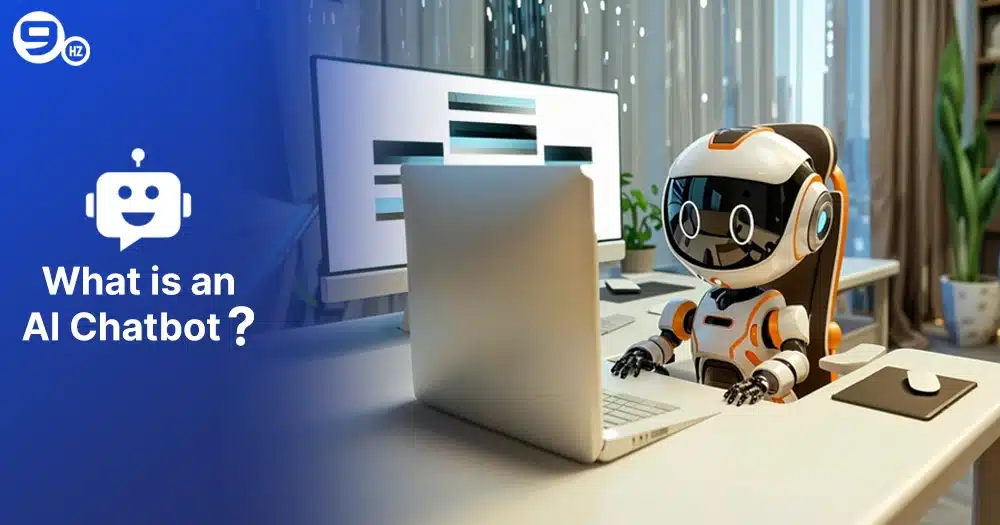
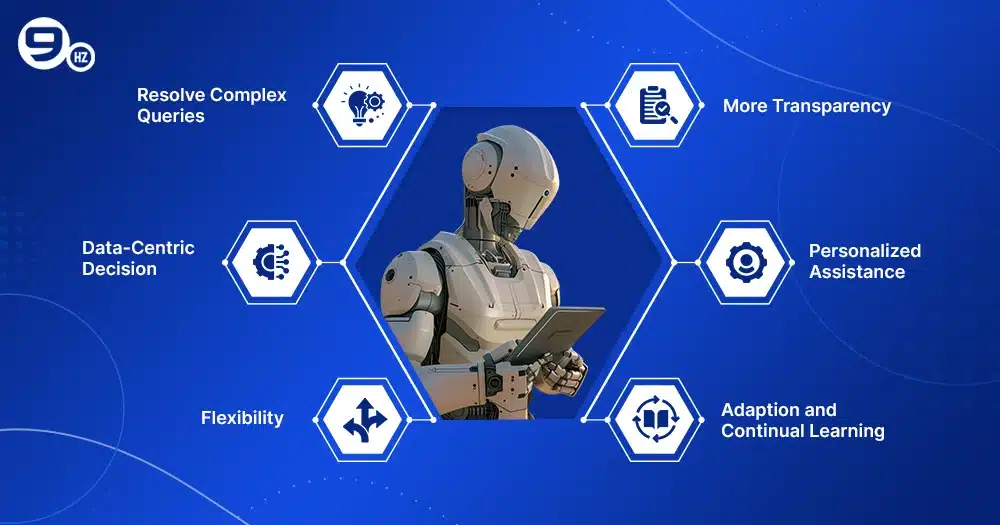
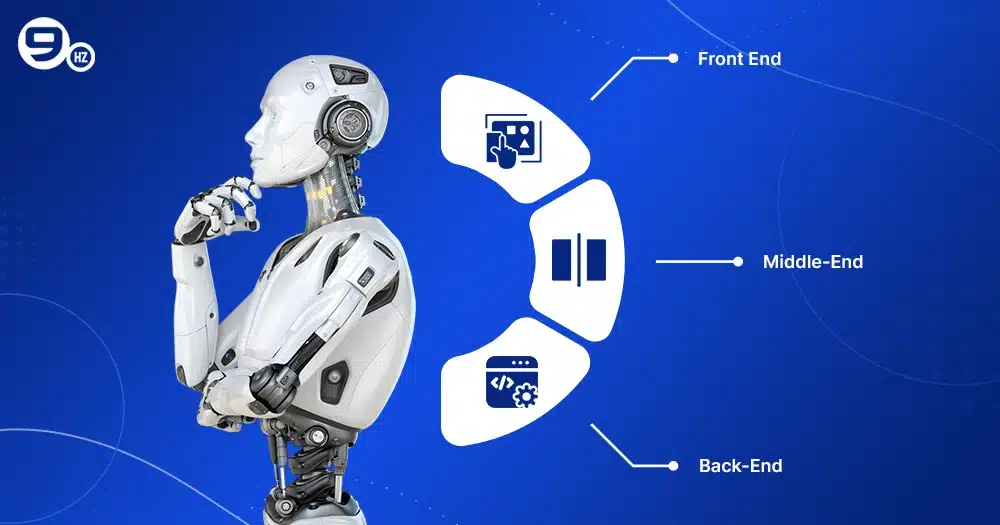
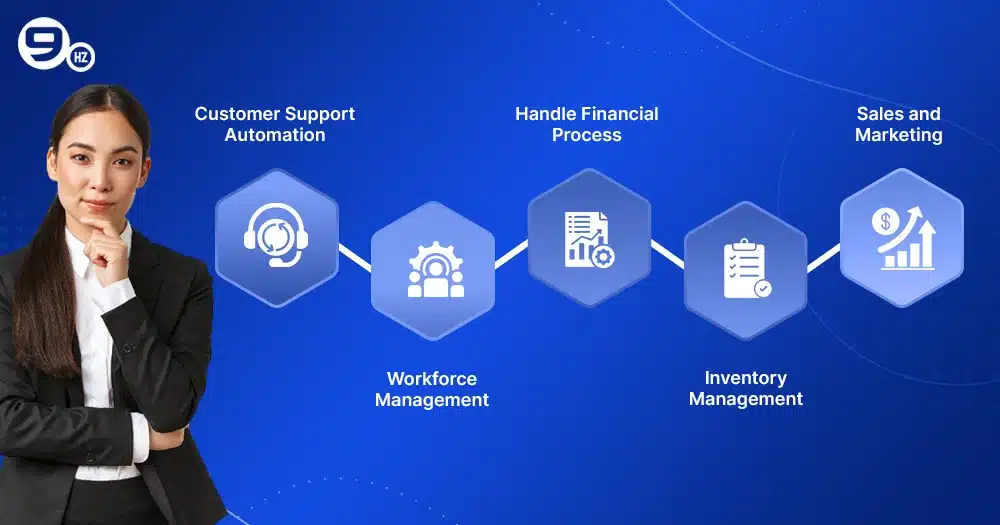
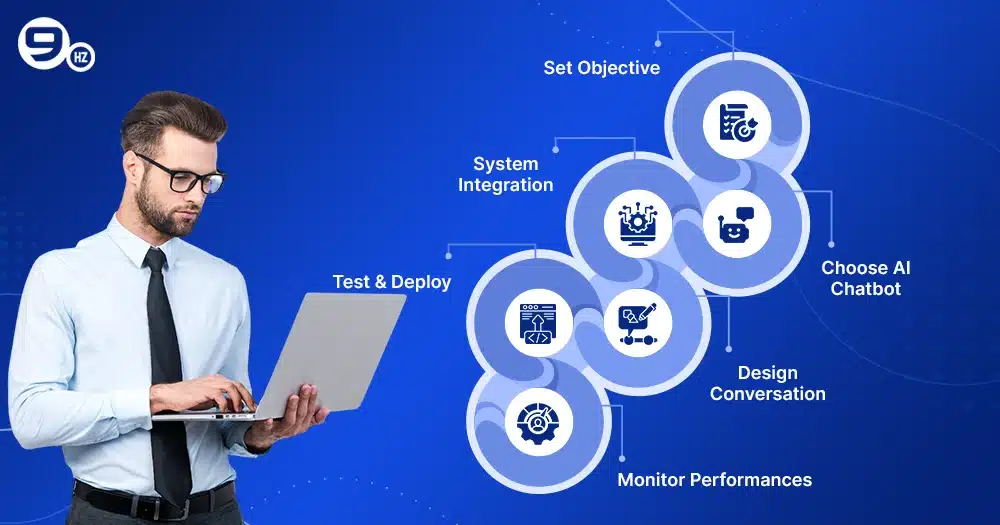
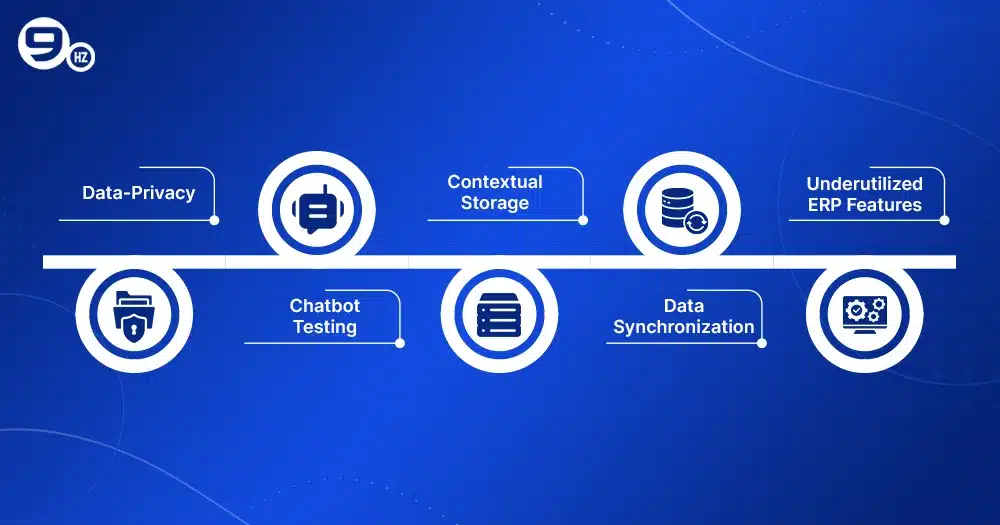
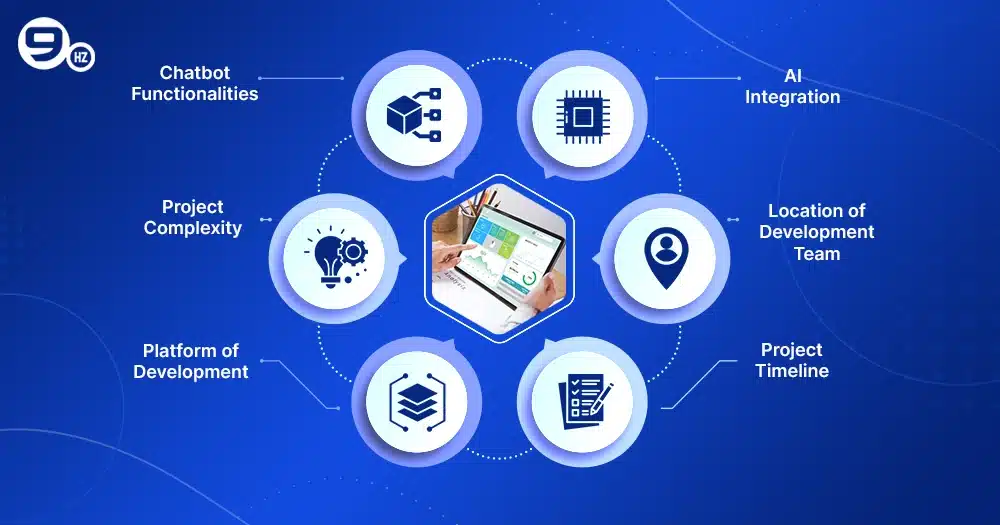

![Building Agentic AI Applications with a Problem-First Approach [2026 Guide]](https://theninehertz.com/wp-content/uploads/2026/02/Building-Agentic-AI-Applications-with-A-Problem-First-Approach.png)






